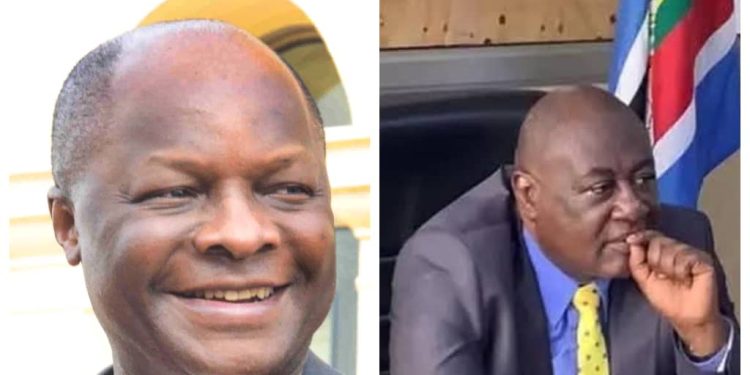The long-running dispute over Kaazi land has taken a decisive legal turn after the High Court issued an order restraining State Minister for Lands, Housing, and Urban Development, Hon. Sam Mayanja, and his agents from any further interference with the Kabaka’s official mailo estate.
The court’s ruling follows months of controversy sparked by Minister Mayanja’s March 2025 directives, which included the cancellation of land titles, boundary adjustments, and the attempted deregistration of the Buganda Land Board.
These actions were taken under the guise of resolving ownership claims linked to the estates of the late Kabaka Daudi Chwa II and Prince George William Mawanda.
Mayanja argued that the Ministry had received petitions asserting that Kaazi land was wrongfully managed and transferred, implicating both the Uganda Scouts Association and the Buganda Land Board in alleged illegal dealings.
He claimed a 1938 deed showed Kabaka Daudi Chwa had intended to donate 100 acres to the Scouts for perpetual use and the remaining 20 acres to his heirs.
But the Buganda Kingdom disputes this narrative — and the courts have now sided with it.
“This ruling is a clear stand for the rule of law and a reminder that reckless directives, even from senior officials, have limits,” said David Mpanga, Minister for Lands and Properties in the Buganda Kingdom.
“Kaazi land belongs to the Kabaka of Buganda, and the evidence is indisputable. The court has reaffirmed our position and protected the integrity of the Kingdom’s land.”
Kaazi is not just another patch of land. It sits on Block 273, Plot 5 — a 350-acre estate allocated to the Kabaka under the 1900 Buganda Agreement. Officially titled in 1923 and later leased in 1948 to the Uganda Scouts Association for exclusive use as a camping ground, the land holds historical and cultural significance.
The 49-year lease agreement was clear: no subleasing or subdivision was allowed. Yet, according to the Kingdom, the Uganda Scouts Association breached the terms by entering into unauthorized transactions some of which the Uganda Land Commission allegedly facilitated.
This lease expired decades ago, and the land was never lawfully transferred to the Scouts. Instead, the Kabaka, through the Buganda Land Board, retained proprietary rights rights which were upheld in 2020 when the Kabaka won a case against claimants, including Prince Kalemeera.
“It is critical to understand that Ssekabaka Daudi Chwa II held this land as Kabaka — not as a private individual,” Mpanga explained. “Land held by the Kabaka is not inherited like personal property. It is passed from one monarch to the next as an institutional holding.”
The Kingdom points to clear differences in land registration: personal property was registered under “Daudi Chwa,” whereas Kaazi land was registered under “H.H. Chwa II,” a title reserved for the reigning Kabaka.
The saga deepened when Mayanja directed the Registrar of Companies to deregister the Buganda Land Board, arguing its 2015 registration as a private entity misrepresented it as a statutory body under the 1962 Uganda Independence Act.
The Uganda Registration Services Bureau (URSB), however, declined to act without a court order a legal line that the High Court has now reaffirmed.
During this time, activities including grading, deforestation, and boundary opening were reportedly carried out by Ministry agents all of which the Kingdom condemned as illegal and provocative.
“What we’ve seen here is not mere overreach,” Mpanga said. “It is a deliberate attempt to destabilize the institution of the Kabaka and rewrite history through unlawful means. The court’s intervention is timely and necessary.”
The High Court ruling, delivered by Justice Bonny Isaac Teko, serves as an immediate freeze on all directives and activities stemming from Minister Mayanja’s March orders. It also reinforces the Kabaka’s legal ownership of Kaazi land and blocks any further government interference unless sanctioned by the court.
The ruling is a significant win for the Buganda Kingdom, which has vowed to continue protecting its land rights using all legal and constitutional avenues.
“We caution all parties involved, including government agencies and individuals, to respect the court’s decision,” the Kingdom stated. “Any defiance will attract legal consequences.”
With this ruling, Buganda reasserts its historical and legal claim to Kaazi not just as a matter of land ownership, but as a defense of its heritage and institutional rights.




















